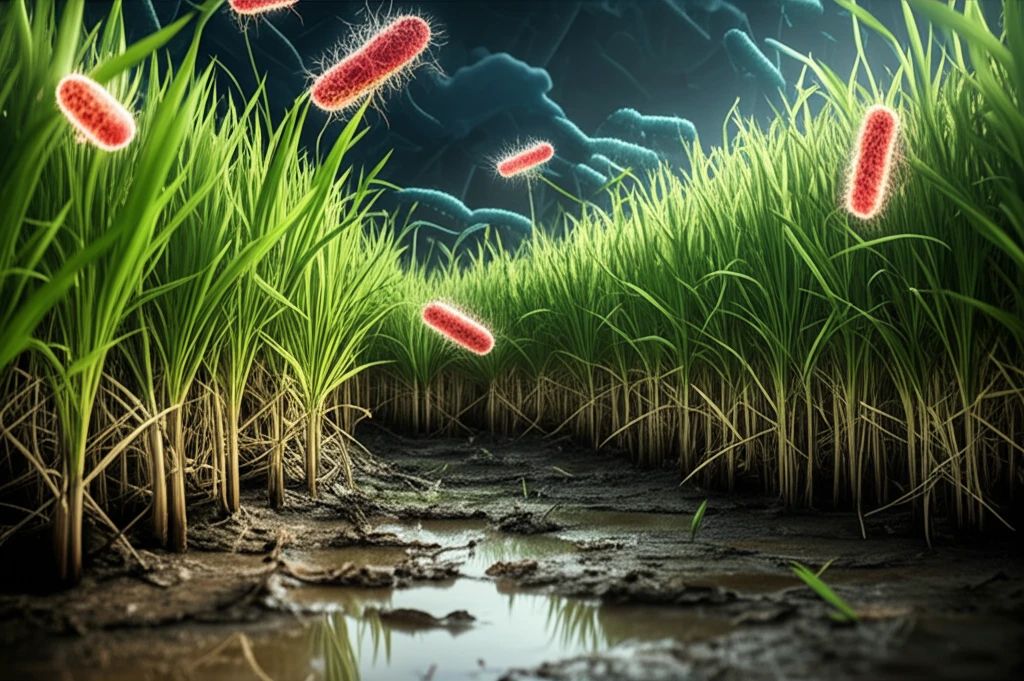
Can Tiny Bacteria Save Our Rice? The Promising Power of Plant Growth-Promoting Rhizobacteria
"Discover how ACC deaminase-producing bacteria can enhance rice growth and salt tolerance, offering a sustainable solution for agriculture."
In an era defined by increasing environmental challenges, ensuring food security is more critical than ever. Among these challenges, soil salinity stands out as a major threat to agricultural productivity worldwide. Saline soils, characterized by high salt concentrations, inhibit plant growth, reduce crop yields, and endanger the livelihoods of farmers. According to the Food and Agricultural Organization (FAO), soil salinity is projected to devastate 50% of arable lands by 2050. Rice, a staple food for billions, faces significant threats from this growing problem.
Traditional methods of combating soil salinity have had limited success. While some salt-tolerant rice varieties have been developed, their yields in highly affected areas remain unsatisfactory. This necessitates innovative and sustainable strategies to protect our crops and ensure food security. Enter plant growth-promoting rhizobacteria (PGPR), a group of beneficial microorganisms that colonize plant roots and enhance plant growth through various mechanisms.
Recent research has highlighted the potential of PGPR in alleviating salt stress in rice seedlings. Specifically, ACC (1-aminocyclopropane-1-carboxylic acid) deaminase-producing bacteria have shown promise in reducing the harmful effects of ethylene, a stress hormone that inhibits plant growth under saline conditions. By modulating ethylene levels and providing other growth-promoting benefits, these bacteria offer a novel approach to improving rice production in salt-affected areas.
How Do ACC Deaminase-Producing Bacteria Help Rice Plants?

ACC deaminase-producing bacteria utilize a fascinating mechanism to help plants cope with salt stress. When plants encounter high salt concentrations, they produce more ethylene, a stress hormone. While ethylene is involved in various plant processes, excessive amounts can hinder growth. These specialized bacteria contain an enzyme called ACC deaminase, which breaks down ACC, the immediate precursor to ethylene. This process effectively lowers ethylene levels in the plant, mitigating its inhibitory effects and allowing the plant to grow more vigorously.
- Enhanced Production of Plant Hormones: P50 produces indole acetic acid (IAA), a plant hormone that promotes root development and overall growth.
- Increased Exopolysaccharide (EPS) Production: EPS helps in binding with cations, decreasing the amount of available Na+ and providing enhanced salt tolerance in the plants.
- Improved Proline Production: Proline acts as an osmoprotectant, helping plants maintain cellular water balance under saline conditions.
The Future of Sustainable Agriculture: Harnessing the Power of PGPR
The study highlights the potential of using salt-tolerant PGPR like Burkholderia sp. P50 as a sustainable approach to improving rice production in salt-affected regions. By reducing stress ethylene, enhancing nutrient availability, and promoting overall plant health, these bacteria offer a promising solution for ensuring food security in challenging environments. Further research and field trials are needed to fully explore the potential of PGPR and optimize their application in agriculture. However, the findings suggest that harnessing the power of these beneficial microorganisms could be a key strategy in building more resilient and sustainable agricultural systems.
